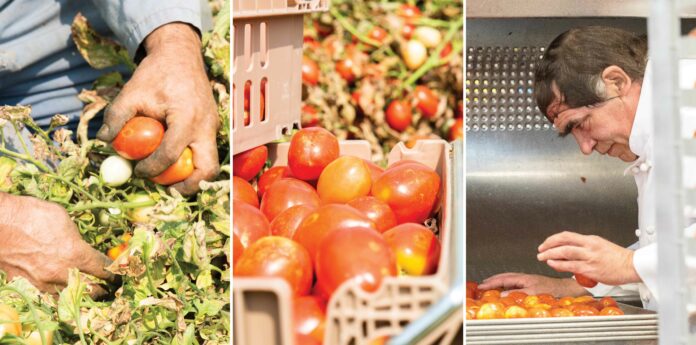Uniting departments, research initiatives, agricultural initiatives to better serve students
UC Davis is shifting to prioritize locally-sourced fruits, vegetables and other food products to enhance students’ on-campus dining experiences. Student Housing and Dining Services, which oversees almost all on-campus dining options for students, is collaborating with Aggie Grown, a campaign focusing on integrating students’ needs and agricultural research departments at UC Davis.
“Aggie Grown” refers to foods grown in UC Davis soil, farmed on UC Davis land or raised on campus. Although local foods can be produced anywhere within 250 miles from UC Davis, Aggie Grown highlights the agriculture and livestock unique to UC Davis.
Kraig Brady, the director of Dining Services, commented on students’ growing interest in knowing where their food comes from.
“They are interested in actually the story behind the farmer, [rancher] or fisherman,” Brady said via email. “We have a campaign around ‘know your broccoli’ where we feature and highlight the broccoli grower and their story.”
This shift toward highlighting local foods follows a change in dining services management. Sodexo, a multinational corporation, formerly managed dining services at UC Davis. Starting in 2017, UC Davis took control of the then three on-campus dining commons and surrounding on-campus food options, such as the Silo.
Under Sodexo’s management, 17% of all resident and retail dining program purchases were locally grown and/or sustainably produced. By the end of 2020, the university aims to source at least 20% of foods available at on-campus dining services from local or on-campus farms and facilities.
Aggie Grown boasts partnerships with numerous on-campus and campus-affiliated organizations, including Russell Ranch, the Student Farm, the campus research ranch, Pastured Poultry Program, Aquaponics, the Meat Lab, Goat Dairy, Olive Oil Center and the Honey and Pollination Center. In addition to providing students with healthier, more responsibly-sourced food options, Aggie Grown also helps fund existing research departments on campus.
When visiting any of the dining centers on campus, students can enjoy pasta with sauce made from fresh, Roma tomatoes grown right in Davis at Russell Ranch. Sites like Russell Ranch provide produce and vegetables for on-campus dining options and give students hands-on opportunities to learn more about agriculture and pruning.
Though not currently providing eggs and poultry to UC Davis Dining Commons, this is something the Pastured Poultry Farm has done in the past.
“We have sold our birds/eggs to them in the past,” said Sarai Acosta, a staff member at the poultry farm and graduate student in global disease biology, via email. “In terms of providing meat, we have given the meat from the [egg laying chickens] to Dining Services once and they had a special barbecue sandwich at Scrubs and Gunrock Pub.”
Eating local has numerous economic and environmental benefits for businesses, farms and consumers. Locally-grown foods are more environmentally-sustainable because of reduced travel distances and reduced greenhouse emissions as a result, according to the Green Action Centre.
The global food system is responsible for about one-third of all anthropogenic greenhouse gas emissions, according to the Intergovernmental Panel on Climate Change. Eating local is one way to combat this. In addition, research suggests that local food systems are also more ecologically sustainable in terms of structure and culture.
Although not conclusively proven, there are also studies that suggest eating locally is more nutritious for consumers as well.
As the third most sustainable campus in the world, prioritizing locally-produced foods aligns with UC Davis’ larger commitment to advancing environmental sustainability.
In addition to existing partnerships, UC Davis Dining Services are engaged in numerous discussions aiming to expand Aggie Grown. Amina Harris, the director at the Honey and Pollination Center, commented on future partnership plans between the two entities.
“The Honey and Pollination Center is in discussion with Dining Services to get top quality UC Davis honey available for student use,” Amina said. “We can’t wait to see our honey used on yogurt, ice cream and in some of the terrific dishes Dining Services offer.”
In partnership with Aggie Grown, Aggie Bloom helps source fresh, seasonal flowers from the Ecological Garden to be delivered weekly to all university catering events and the four dining commons on campus.
Written by: Ally Russell — campus@theaggie.org



